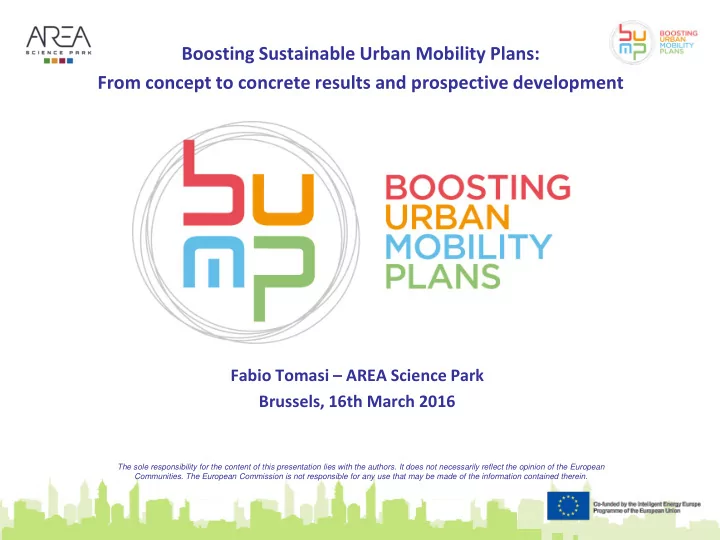

Boosting Sustainable Urban Mobility Plans: From concept to concrete results and prospective development Fabio Tomasi – AREA Science Park Brussels, 16th March 2016 The sole responsibility for the content of this presentation lies with the authors. It does not necessarily reflect the opinion of the European Communities. The European Commission is not responsible for any use that may be made of the information contained therein.
BUMP: the partnership VIA ALTA a. s. (CZ) AREA Science Park (IT) www.via-alta.cz/en/ Project coordinator www.areasciencepark.it REC Regional Environmental Centre (HU) TUDO www.rec.org Technical University Dortmund (DE) REC Poland country office (PL) www.tu-dortmund.de http://poland.rec.org/ SWEA Severn Wye Energy Agency (UK) CIRCE - Centre of Research for Energy www.swea.co.uk Resources and Consumption (SP) http://fcirce.es/ CSDCS - Club Sustainable Development ALEA – Alba Local Energy Agency (RO) of Civil Society (BG) www.alea.ro/en www.csdcs.org
What prevents small-medium cities from developing a SUMP? It’s not mandatory We don’t have money We don’t have human resources We don’t know how We have already a traffic plan
BUMP’s approach: main objective and solution Objective Building capacity within local authorities to allow technical officers and political decision makers to develop, implement and monitor their SUMPs, whether they decide to carry out the work independently or to entrust part of the tasks to third parties. BUMP’s methodology: four steps towards sustainable mobility 1. In-class training 2. Mutual learning 3. Coaching 4. Study visits to BUMP pioneer cities Translation of SUMP Guidelines into Bulgarian, Czech, German, Hungarian, Italian, Polish, Romanian and Spanish.
BUMP’s methodology: preparation process From the common EU-level model to national adaptations, preparing for on-the-field implementation Recruitment of National adaptations Individual country- Definition of the common beneficiaries and through focus group specific training appointment of supporting package sessions programs trainers Main issues tackled during focus group sessions: - Recruitment of beneficiary local authorities; - Requirements for the appointment of trainers; - Training adaptation to national features and peculiarities;
Training Module 1: SUMP as a process - Integrated planning and sustainable mobility management. Module 2: Evaluation and monitoring - Context analysis and baseline assessment. Module 3: Integration and innovation: concrete actions and measures to foster sustainable mobility. Module 4: Coordinating different levels and assigning responsibilities. Module 5: Realizing the plan: implementation, participation and monitoring. Module 6: Pilot actions: identifying risks and getting pilot actions underway.
BUMP: mutual learning 4 events September-November 2014 Day 1: representatives of trainees from 8 countries meet and work together Day 2: conference open to all stakeholders and citizens to raise awareness on sustainable mobility and discuss the most relevant issues Trieste (Italy) Dortmund (Germany) 24-25 September 2014 19-20 November 2014 Sofia (Bulgaria) Szentendre (Hungary) 20-21 October 2014 5-6 November 2014
Mutual Learning Workshops • Day 1 (for training participants only): World café session, role playing • Day 2 (open to the public) Presentation of results from previous day + speakers related to the topics discussed in day 1
Coaching • Only for the most promising cities of the training • Support from experts • Mutual learning among cities
BUMP: study visits Goal : promoting good methodologies practices and outputs produced in the frame of the project 60+ applications received From Portugal, Italy, Spain, the Netherlands, Romania, Cyprus, Poland, Latvia, Slovenia, Croatia, Albania, Serbia, Macedonia, Bosnia Herzegovina 30 study visits 7 replicating organizations interested in adopting and implementing BUMP’s This sort of initiatives is helpful for visitor and receiver cities, because the methodologies and tools from Austria, sharing of good practices, the exchange of knowledge and experience, Croatia, Portugal, Romania, Slovakia, and the technical know-how dissemination can help cities to optimise their Spain, UK economic and technical resources. (V.R. feedback on her visit)
Results achieved • 177 participants to the training from 87 communities (100% satisfied) • 62 coached cities • 36 SUMPs • A tested methodology to support local authorities in mobility and not only
What’s next? • BUMP style activities in 15 countries • Several follow up projects • Issue to be further explored: – SEAP – SUMP (SIMPLA project H2020) – tools for SUMPs – innovative funding solutions and business models for investments in sustainable urban mobility
Learn more on BUMP! www.bump-mobility.eu Fabio Tomasi Project office manager AREA Science Park Padriciano 99, Trieste, Italy TEL +39 040 375 5268 EMAIL fabio.tomasi@area.trieste.it www.areasciencepark.it
Recommend
More recommend